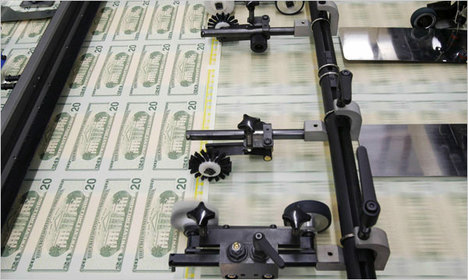If Congress and the president don’t raise the debt ceiling, the consequences will be disastrous, politicians and pundits tell us, — the equivalent of an economic Armageddon. And President Obama warns that the consequences are so dire that he cannot possibly tolerate any delay in making an agreement. He announced yesterday that any debt deal must be completed by July 15th.
According to Treasury Secretary Timothy F. Geithner, failure to raise the limit will cause the US to default and “cause a financial crisis potentially more severe than the crisis from which we are only now starting to recover.” On Thursday, he renewed these warnings. And President Obama alarmed retired Americans this week: “I cannot guarantee that those [Social Security] checks go out on August 3rd if we haven’t resolved this issue. Because there may simply not be the money in the coffers to do it.”
But the list of terrible things to come, if the government is stopped from continued deficit spending, goes on. Failure to raise the ceiling, it is warned, will dramatically raise mortgage interest rates, cause housing sales to plunge, create panic on world financial markets, and destroy the value of the dollar.
Austan Goolsbee, Obama’s head of his Counsel of Economic Advisers, went so far this week as to blame the continued slow economic recovery on those few politicians who are against raising the debt ceiling. “[I]t’s important we remove this wet blanket of uncertainty that is permeating the private sector where they don’t know that the government — there are people actively advocating that the government declare it’s not going to pay its bills,” he told MSNBC. Yet, the slow recovery has been going on for over two years, well before Republicans obtained control of the House of Representatives.
A new CBS News poll shows that Americans oppose increasing the debt ceiling, by a 69 to 24 percent margin. Mr. Obama dismissed this and, as usual, believes he knows better. According to him, Americans just don’t understand the complexities of the arguments: “Let me distinguish between professional politicians and the public at large. The public is not paying close attention to the ins and outs of how a Treasury (bond) auction goes. They shouldn’t. . . . They’ve got a lot of other things on their plate. We’re paid to worry about it. . . . Now, I will say that some of the professional politicians know better. And for them to say that we shouldn’t be raising the debt ceiling is irresponsible. They know better.”
But the general public is right. There is an overload from all the doomsday predictions. Earlier this year, before the debt limit was hit on May 21st, the Obama administration already used the same scare tactics.
Take seven myths that the Obama administration is pushing:
1) Not increasing the debt ceiling means the US government will default on its debt.
This is probably the biggest lie that almost all other claims arise from. Default occurs if the government stops paying interest on the money that it owes. Not increasing the debt ceiling only means that the government can’t borrow more money and that spending is limited to the revenue the government brings in. And, with interest payments on the debt making up less than a ninth of revenue, there is no reason for any risk of insolvency.
Time after time, congress and the president have failed to agree on a debt ceiling increase and still there has been no default. Examples include: December 1973, March 1979, November 1983, December 1985, August 1987, November 1995, December 1995 to January 1996, and September 2007.
Indeed, this really shouldn’t even be a point of debate. The 14th Amendment to the Constitution requires that the debt payments come first before any other spending.
For the rest of the myths see this discussion available here at Fox News.

COMMENTS
Please let us know if you're having issues with commenting.